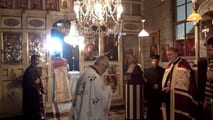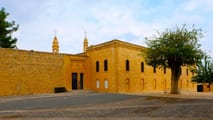
11 Years After the Introduction of the Case, the ECHR Holds that the Greek-Catholic Parish Sisesti is “No Longer a Victim”, as it Recovered the Property of its Church Three Years Ago
Greek-Catholic Parish v. Romania


On 3 November 2015, more than 11 years after the introduction of the case, the European Court of Human Rights (ECHR) published its judgment in Greek-Catholic Parish Sisesti v. Romania case (no. 32419/04). The case concerns the restitution of the parish church and its attached land, as well as other three lands that before their abusive transfer to the Orthodox Church in 1948 belonged to the Greek-Catholic parish.
It raises the same issue that was sanctioned by the Court in its judgement of 12 January 2010 in Greek-Catholic Parish Sambata Bihor v. Romania (no. 48107/99) case, ten years after the introduction of the case to the Court. In this judgment the Court held that the general exclusion of the competence of the tribunals to settle disputes on restitution of religious buildings is contrary to the right to access to court (Article 6 of the Convention), especially since the system of the prior conflict resolution procedure established by the law n° 126/ 1990 (the joint commissions) was not sufficiently regulated and its judicial control inadequate (§§ 66-75). It welcomed the change of legislation in 2004 and 2005 which allowed the Greek-Catholic parishes to introduce an action before the tribunals in order to recover their property rights, even if previously they introduced such actions and they were declared inadmissible. Nevertheless, it noted that this change of legislation came too late for Sambata Bihor Parish (§ 74).
This was not considered to be the case for Sisesti Parish. In this case, the Court found only a violation of the Convention for a length of proceedings of seven years and seven months, rejecting the complaints of the applicants regarding the access to court, the freedom of religion, the right to property and the discrimination in the exercise of those rights. To arrive to this conclusion, it took into account the developments in the case at the national level since the final judgment of 24 February 2004 by which the High Court of Justice declared itself incompetent to judge the case on merits and which was the reason of the procedure before the ECHR. Therefore, the Court held that the applicant is no longer a victim in the sense of the Convention.
Regarding the complaint of access to court, freedom of religion and right to property, the Court noted that, after a new civil action, the parish recovered its church and attached land by a final judgment of 21 September 2011 and entered into their possession on 15 August 2012. The County tribunal observed that the property rights for those possessions were inscribed in the Land Registry on the name of the parish. As for the three lands, the Court noted that the internal tribunals observed that the applicant did not adequately follow the internal procedures to recover them (§§ 34 and 35). The County tribunal considered that for one of the lands the applicant should have followed the procedure provided by the special law and for the other two lands, the parish should have requested the restitution before the closing of the debates during the trial.
Concerning the complaint of discrimination in the exercise of the right to access to court, of the right to freedom of religion and of the right to property, the Court acknowledged that the tribunals applied correctly the common law regarding the action of recovery of property, the outcome being favorable to the applicant (§ 36).
With reference to the complaint according to which the decision of Constitutional Court of Romania of 27 September 2012 (published on 29 November 2012) could put into question the restitution of the church and its attached land, the Court remarked that to present the restitution decision was not challenged (§ 37) and that the applicant did not prove that this could happen, as the decisions of the Constitution Court are binding for the courts from the date of their publication and for the future. Moreover, held the Court, the applicant did not indicate by which means the restitution could be challenged (§§ 38 and 39).
Currently, there are two similar pending cases before the ECHR - Greek-Catholic Parishes Comana de Jos v. Romania (no. 35795/03) and Greek-Catholic Parish Sura Mica (Sibiu) v. Romania (no. 46347/08), as the civil actions of the applicants were declared inadmissible by the internal tribunals, as they did not exhausted the prior procedure before the joint commissions.
An overview of the situation of the properties of the Romanian Greek-Catholic parishes before the Court can be found here.
Andreea Popescu













